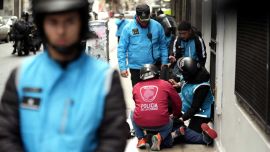Described as the most ambitious railway project of modern Argentina, the Sarmiento rail underpass has officially become an underground monument to wishful thinking.
Some 17 years after its announcement, President Javier Milei’s government and the construction companies in the consortium leading the project, Sacde (formerly known as IESCA) and Italy’s Ghella, have agreed to scrap the “soterramiento del Sarmiento” project, sealing up the seven-kilometre tunnel constructed thus far.
The decision, revealed by the journalist Diego Cabot in the La Nación newspaper, implies leaving underground an investment of US$420 million with the gigantic tunnel excavator already impossible to salvage.
As Cabot relayed in his investigation, the decision ends a history of unfulfilled promises, paralysis and suspicions of corruption stretching over two decades and across political lines. The project, put out to tender by then-president Néstor Kirchner in February 2006 and announced with great fanfare by Cristina Fernández de Kirchner in 2008, promised a tunnel of 32.6 kilometres from Caballito to Moreno. But the project only advanced a minimal distance and now will be walled off at both extremes.
The project, which initial plans should have been finalised in three years, was paralysed most of its 17-year lifespan. The tunnel excavator named "Argentina," a "mechanical worm" some 125 metres in length, arrived in the country in 2011 but never went to work under the Kirchnerite governments. Not until 2016, under the Mauricio Macri Presidency, did the machine begin to dig. It came to a halt at Villa Luro in 2018. During Alberto Fernández’s 2019-2023 government, the project was forgotten.
In 2019, a number of business figures and ex-government officials were cleared of allegations relating to alleged corruption and the project on the grounds of a lack of evidence. Among the executives was former IESCA CEO Ángelo Calcaterra, the cousin of former president Mauricio Macri.
A case had been initially opened after officials from Brazilian firm Odebrecht confessed in a trial in that country that they paid at least US$35 million in bribes to Argentine officials over an eight-year period for at least three public works projects, including the Sarmiento project.
The Milei administration has decided "to come clean with a project which could not be financed" and agreed with the companies to cancel the contract, according to the La Nación report.
"The tunnel will remain closed in order to preserve what has been done. The idea is to wall everything off and leave things as they are," a senior government source confirmed to Cabot.
Abandoning the project not only leaves a fortune in public money underground but also perpetuates the sufferings of the neighbours of the Sarmiento line, who have coexisted for 17 years with loud workshops, closed roads and lanes and the impossibility of advancing on transport solutions, all the while waiting for an underground train which never came.
– TIMES/NA




















Comments